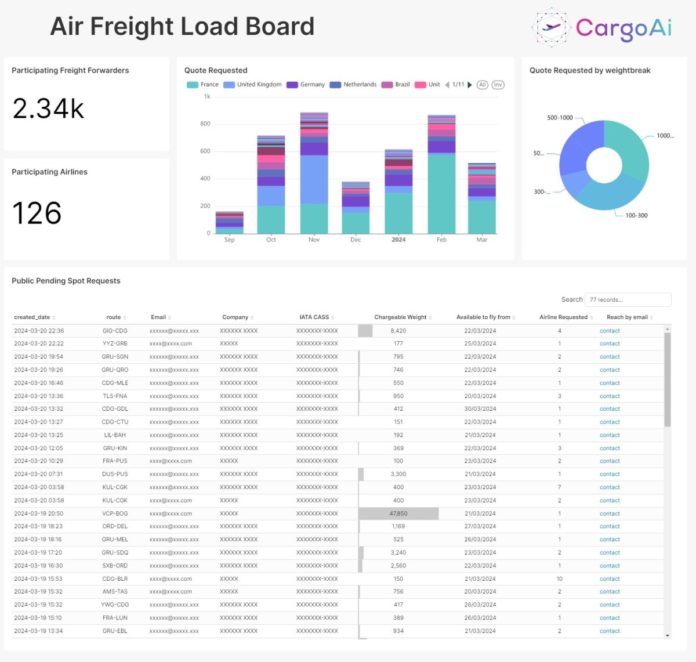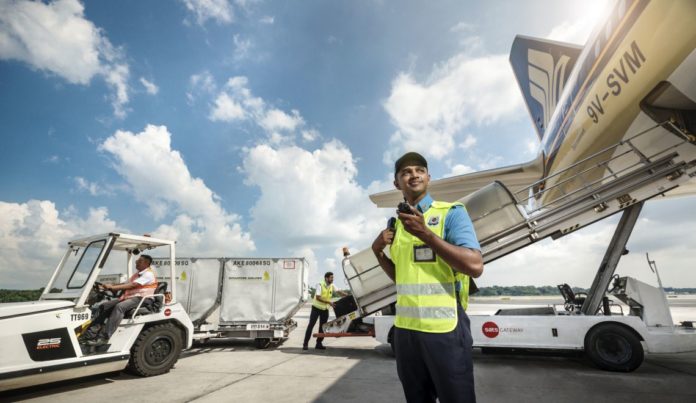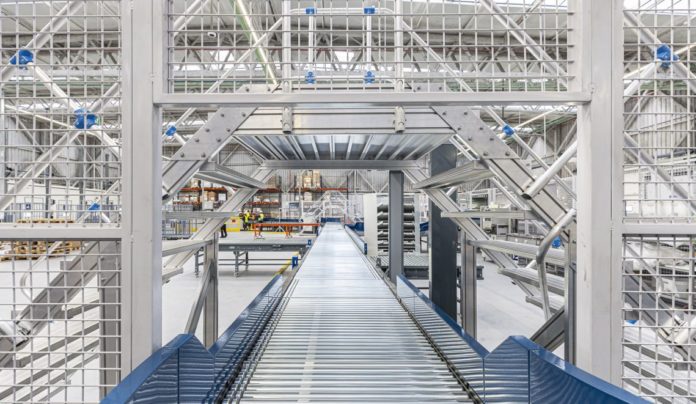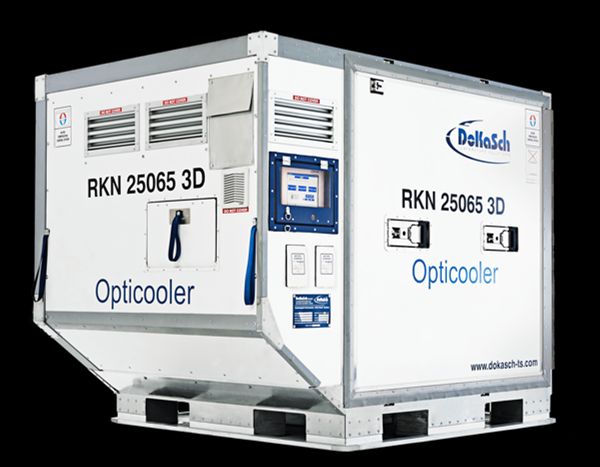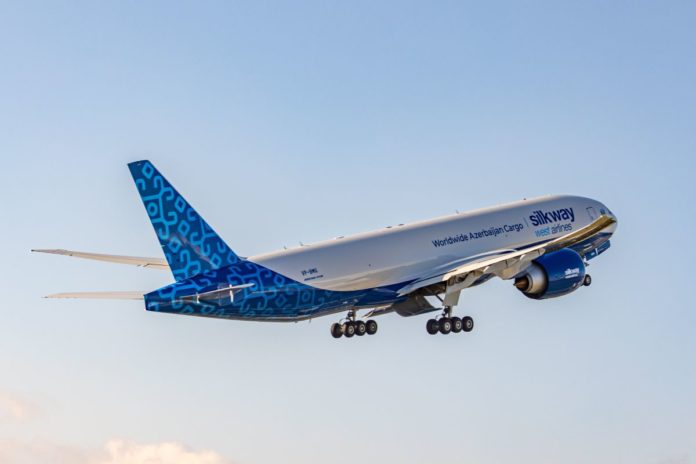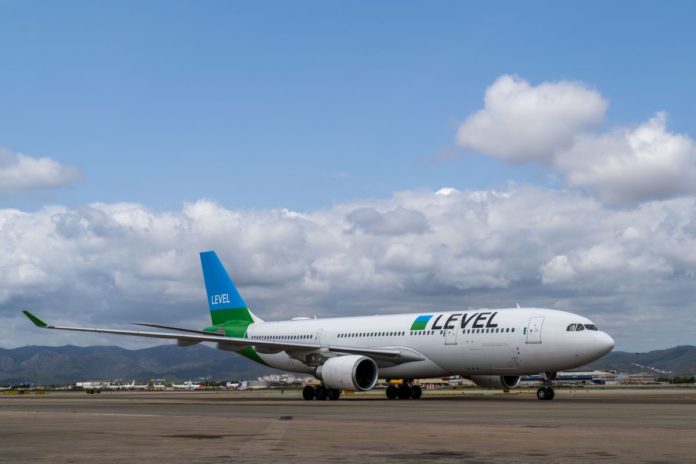The CargoAi online marketplace is now offering an Air Freight Load Board for spot cargo. Airlines can now access a comprehensive database of available freight, complete with detailed cargo specifications, in their CargoMART Airline App.Users can browse through a wide range of available freight listings, tailored to specific preferences and requirements and connect directly with contacts.
Fish fly with American Airlines
American Airlines Cargo says it is moving record numbers of decorative koi carp, or Nishikigoi, from Japan to destinations around the globe. The ornamental fish are highly prized by collectors. The most beautiful of the specimens can grow to more than 100 cm in length and be valued at $2 million each.
Naturally, the fish therefore require special handling when traveling by air.
In 2023, American Airlines Cargo in Japan transported koi in record volumes – more than 19,100kg to Los Angeles and 9,600kg to Dallas alone.
Director of cargo sales, Emma Oliver, said: “These living works of art are beautiful creatures and require highly specialized knowledge and training in order to ship them. The transportation of the Nishikigoi must be on direct flights due to their sensitivity, with great precautions taken to tailor their travel accommodations to their oxygen needs.”
SATS and Sterling to speed urgent aircraft parts
Kuehne+Nagel’s aerospace arm, Sterling, has partnered with SATS to expedite first- and last-mile airside services for time-critical aircraft-on-ground (AOG) shipments.
Singapore and London Heathrow airports will operate a trial of the new service and the companies plan to implement the services at other airports within Sterling’s network in the coming months.
The partnership combines Sterling’s critical logistics expertise with the enhanced visibility provided by SATS for express shipments booked with airlines. It also includes specialised handling at the point of origin and destination to manage AOG shipments and via key time stamps for updates on the shipment’s status on the ground.
It follows a memorandum of understanding signed last October to drive value chain improvements and sustainability efforts within the air logistics industry. The two parties have conducted several other proofs of concept to optimise ground handling for e-commerce shipments and air charter hub and spoke operations, as well as this airside service to improve shipment visibility and cargo processing speeds for time-critical shipments.
Hactl pact urges tenants: Waste not, want not
Hong Kong Air Cargo Terminals Limited (Hactl) has launched a voluntary Green Terminal Pact (GTP) to encourage its SuperTerminal 1 tenants to reduce carbon footprint and create an environmentally-conscious workplace.
It will also help them prepare for Hong Kong’s Municipal Solid Waste (MSW) Charging Scheme. Hactl has installed smart meters in participating tenants’ offices to help track energy consumption, and has organised numerous briefings on the new scheme. It has also installed an additional recycling machine at its terminal, and will continue to collect waste for recycling.
A key element of the GTP is a Performance Reward Scheme, the first of its kind at the airport, in which participating tenants set targets for reduced energy consumption and waste, and increased recycling. Successful achievement of targets will earn trophies, and vouchers which can be used by tenants’ staff to buy a wide range of goods from local social enterprises.
Tenants occupying over 70% of SuperTerminal 1’s rented office space have already committed to signing the Pact.
In 2018, Hactl launched its Green Terminal programme with the aim of creating the world’s greenest air cargo handling operation. Annual Green Weeks held over recent years have reinforced Hactl’s sustainability message to all staff, and encouraged their active participation through changes to their behaviour and lifestyle.
FedEx Express reopens enhanced Madrid gateway
FedEx Express has opened a newly refettled facility in the cargo center of the Adolfo Suarez – Madrid Barajas Airport. The project included full refurbishment of the warehouse, external yard and office block, as well as the installation of a new sort system, castor deck equipment and photovoltaic system.
The main warehouse will be able to manage an inbound capacity of 3,600 packages per hour, plus an outbound X-ray sorting capacity of 450 packages per hour and 1,800 packages per hour for X-ray by-pass. For larger shipments, The site has up to 17 docks for trailers, trucks, and vans for loading and unloading shipments.
Managing director of ground operations for FedEx Spain and Portugal, Ian Silverton, said: “This new gateway will increase handling capacity, provide better reliability and improve the working environment for the team members working at the facility.”
The facility will benefit from the installation of solar panels which are already in place at some of FedEx Europe’s key facilities including Paris and Cologne Hub. The Madrid Gateway will feature 156 and produce about 95 megawatt hours of electricity annually or 17% of the needs of the premises.
Delta Cargo approves ‘Mini Opticooler’
Delta Cargo has given technical approval for DoKaSch Temperature Solutions’ Opticooler RKN container. The Atlanta-based carrier has been using DoKaSch´s RAP container since 2020 but the addition of the Opticooler RKN offers a solution for more compact temperature-controlled pharma freight.
Delta Cargo operates a global pharma network of 46 approved stations, with recent expansions including Chicago (ORD), Philadelphia (PHL) and Raleigh (RDU). It was the first US passenger airline to receive IATA’s Center of Excellence for Independent Validators (CEIV) Pharma Logistics Certification, and all Pharma stations adhere to Good Distribution Practice (GDP) standards.
The airline’s managing director of global sales and product development, Alison Ricker, said: “The integration of the Opticooler RKN into our fleet represents our ongoing commitment to serving the complex needs of the healthcare and pharmaceutical industries. We continue to invest in our facilities, operations and staff, steadfastly upholding the most rigorous industry standards. Our commitment ensures customers have ample choices and world-class reliability for their pharmaceutical shipments.”
Managing director of DoKaSch Temperature Solutions, Andreas Seitz, added: “Our collaboration with Delta Cargo, a key player in the US market, highlights the reliability and quality of our Opticooler® RKN. This partnership not only expands our presence in the USA but also strengthens our global network.”
The German-based container maker says that its partnership with Delta Cargo is particularly significant as the US pharmaceutical market is a major component of the global industry. The sector is witnessing substantial growth, especially in the field of biosimilars, and is continually developing new products, creating an escalating need for specialized, temperature-controlled logistics solutions.
The Opticooler, available in RKN and RAP versions, are electrically powered, fully air-conditioned units that can maintain precise temperatures without relying on dry ice and are equipped with batteries for continuous operation.
Silk Way tops up freighter order
Azerbaijan’s Silk Way West Airlines is to buy an additional Boeing 777 Freighter, scheduled for delivery in 2025. The carrier had already committed to purchasing five similar aircraft, two of which have already been received, with delivery of the remainder to take place by 2027.
The Boeing 777 Freighter offers reduced emissions and lower fuel consumption compared to other freighter aircraft with lightweight composite materials and advanced aerodynamics.
IAG launches Miami-Barcelona route
IAG Cargo has launched a new three-times weekly bellyhold service between Barcelona and Miami, increasing to four services per week from June. It will be the carrier’s fifth direct connection to the US from the Spanish city and will be operated by IAG’s Level arm.
Barcelona is one of IAG Cargo’s four hubs, alongside London Heathrow, Madrid, and Dublin, and is home to two of the IAG Group’s airlines, LEVEL and Vueling.
IAG Cargo already operates from Barcelona to Boston, Los Angeles, New York JFK and San Francisco – the latter route restarts from 31 March, four times a week.
The carrier’s chief sales and marketing officer, Camilo Garcia Cervera, said: “The transatlantic corridor is an important part of our network and supports so many of our customers. Miami is a thriving logistics hub, strategic for air freight. With our already well-established network connecting major cities in the US with Europe, this new route will enhance our connectivity even more.”
Delta to restart Tel Aviv flights
Delta is to resume daily services from New York-JFK to Tel Aviv, Israel from June 7. The route will be operated by an Airbus A330-900neo. The decision to resume the route temporarily suspended in October 2023, follows an extensive security risk assessment. Delta says it continues to closely monitor the situation in Israel.
Firms flock to sign IATA digital charter
IATA has signed up Cathay Cargo, CHAMP Cargosystems, Global Logistics System, IAG Cargo, IBS Software, LATAM Cargo, and Lufthansa Cargo as inaugural members of its Digitalization Leadership Charter.
The charter, announced at IATA’s World Cargo Symposium in Hong Kong on 14 March, aims to boost innovation and efficiency while promoting sustainable and harmonized digital transformation with data sharing based on IATA’s ONE Record protocol.
The Digital Leadership members must commit to developing unified and collaborative digital strategies, interoperability and to use new technology ethically.
It also calls for resilience through robust infrastructure and safeguards against cybersecurity risks.







